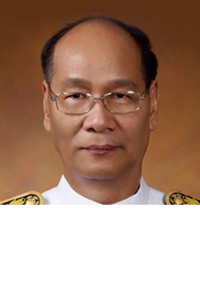In 2013, the People's Democratic Reform Committee (PDRC) was formed, with members branding themselves as true patriots who maintained that the majority of those who were in the opposition came to power through vote-buying. They pushed for heavier legal punishments and removing the statute of limitations in cases involving corrupt politicians. They organised political rallies, obstructing many polling stations. The leaders were arrested and tried. The court saw this as a disruption of public services, which they saw as tantamount to terrorism and insurrection. On Feb 24, 2021 they were sentenced to imprisonment but released on bail.
Despite the political chaos and disorder created, the PDRC made a clarion call for political reform, which at that time seemed to resonate with millions of Thais from many walks of life who were fed up with the political tugs of war between the yellow shirts and the red shirts, characterised by verbal assaults, orchestrated violence, and loss of lives. Most of the silent Thais did not want to see continued power grabs, which ended up in a cycle of coups and new constitutions, all for the purpose of whitewashing the military junta, crushing political foes, and protecting the interests of the elites and the bureaucrats with little or no regard for the needs of the majority of the citizens.
Seven years after that drive for political reform, Thailand is returning to square one again. Most Thais who are sensible enough and are not concerned with protecting their own status quo realise that the problem of rampant corruption and the lack of accountability of government to its citizens has yet to be addressed. Politics in Thailand is still all about protecting, sharing and dividing interests. The political reform propagated by the PDRC has turned out to be more of a discourse than any actual action by leaders for the advancement of the country. The aristocratic style of leaders fuelled by ineffective public management and weak governance are stumbling blocks to political progress.
Seeing no improvement in sight and concerned about their bleak future, a group of youngsters, largely aged 15 to 30, staged a new style of demonstration and demanded comprehensive socio-economic and political transformation, not just political reform as advocated by the PDRC. These demands can only materialise through revolutionising and restructuring public management and governance. Never before in the history of Thailand have we seen demonstrations like these, organised and carried out largely by young people without a political leader (despite the insistence by those in power that they were driven by "outside forces"). These youths are mostly new college graduates or university students. They are more informed about global affairs and issues related to public management and governance. They address issues such as human rights, gender equality, education reform, responsive public policies, inequity, inclusivity, and transparency. Some topics they address are subtle and sensitive, but central to the wellbeing of future generations.
The notions of public management and governance are foreign to much of Thai society and are not understood by many elites who are content with the status quo. It is not surprising, therefore, that these youths were not able to sustain support from the public. The average Thai person may have a general grasp of what poor public management entails from their experiences of seeking services from public agencies. Far fewer have a feel for what is meant by public governance, which refers to how government officials make decisions regarding how public services are carried out and for whom.
Commonly, governance refers to processes that are designed to ensure accountability, transparency, responsiveness, rule of law, equity and inclusiveness, empowerment, effectiveness and efficiency, and broadly-based civic engagement. All these components are interrelated and reinforce each other as pillars of public management.
Since the 2014 coup, Thailand has drifted toward a byzantine style of governing, whereby the magistrates and aristocracy (appointed senators) have power over the people. In a democracy, the three governmental branches, legislative, executive, and judicial, should balance each other. In Thailand, the appointed senators have the effective power of all branches. The functional and symmetrical relationships between politicians, bureaucrats and citizens have been absent. In an ideal situation, the bureaucrats are accountable to politicians, who in turn are accountable to the citizens. In Thailand, both the politicians and bureaucrats, in tandem, rule the citizens, whose nominal power comes only on a rare election day.
Because of this aristocratic mindset, the current government made opaque decisions regarding development projects, such as the awarding of business concessions to private companies, with affected citizens not having a chance to engage in determining the benefits and adverse impacts on them. According to the International Commission of Jurists, there are resulting concerns about violations of human rights. Other examples of lack of transparency are decisions on duty-free concession services at Suvarnabhumi airport, before the expiration of the one still in effect and the way the government conducted the means testing of people who are entitled to welfare cards.
Currently, there is distrust about the procurement and administration of Covid-19 vaccines, selecting a low-efficacy vaccine from one company versus other available brands that show higher efficacy. Also central to the governance issue is the decision about who should be inoculated first. Why have politicians been vaccinated before frontline health workers or people at higher risk? These are but a few examples of a lack of implementation of the principles of good governance. It is high time to place greater importance on and improve governance in public organisations. Using available digital technology will allow citizens to work in partnership with the government in their pursuit for more comprehensive reform, not just political reform advocated by the PDRC that is unlikely to materialise anytime soon.
